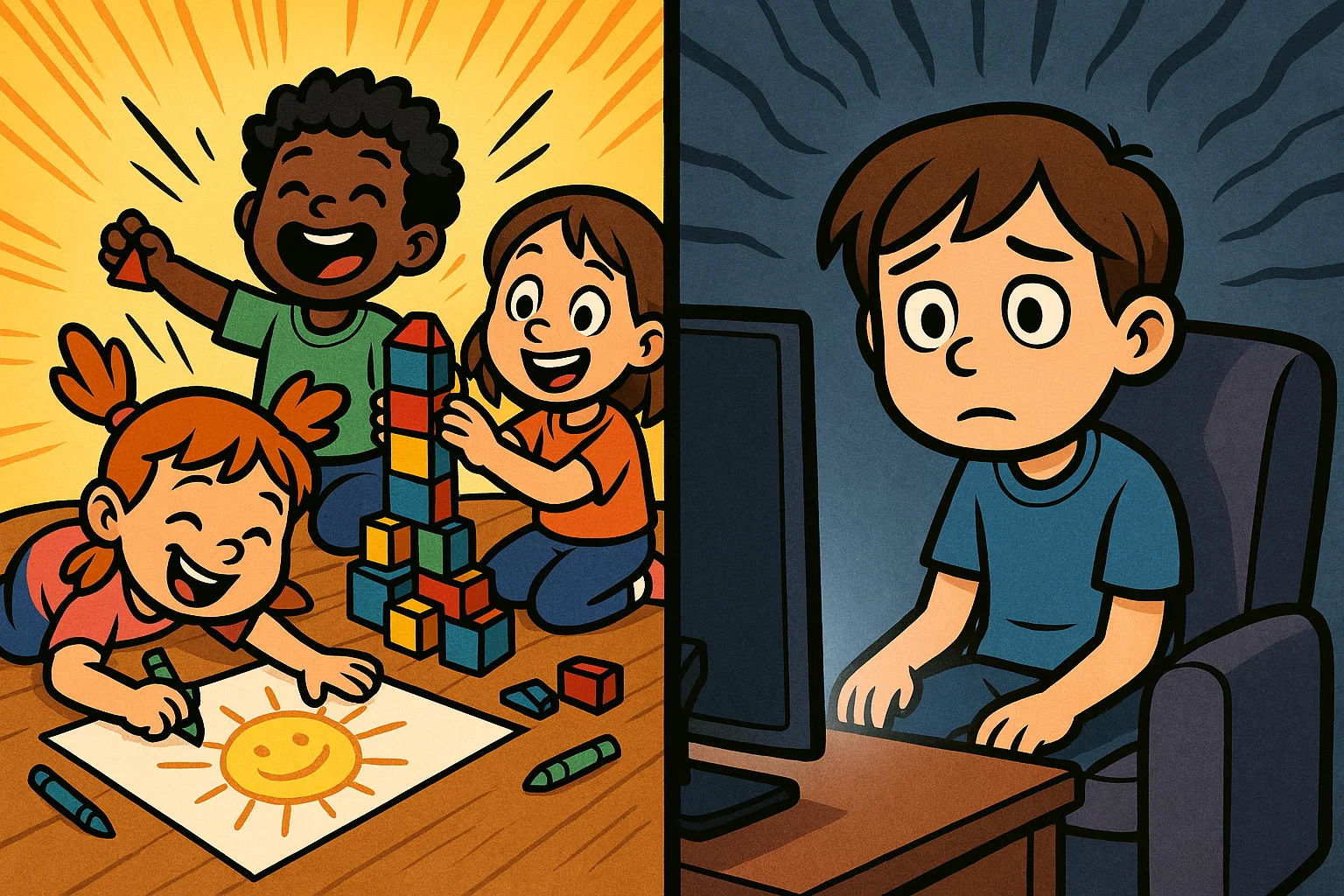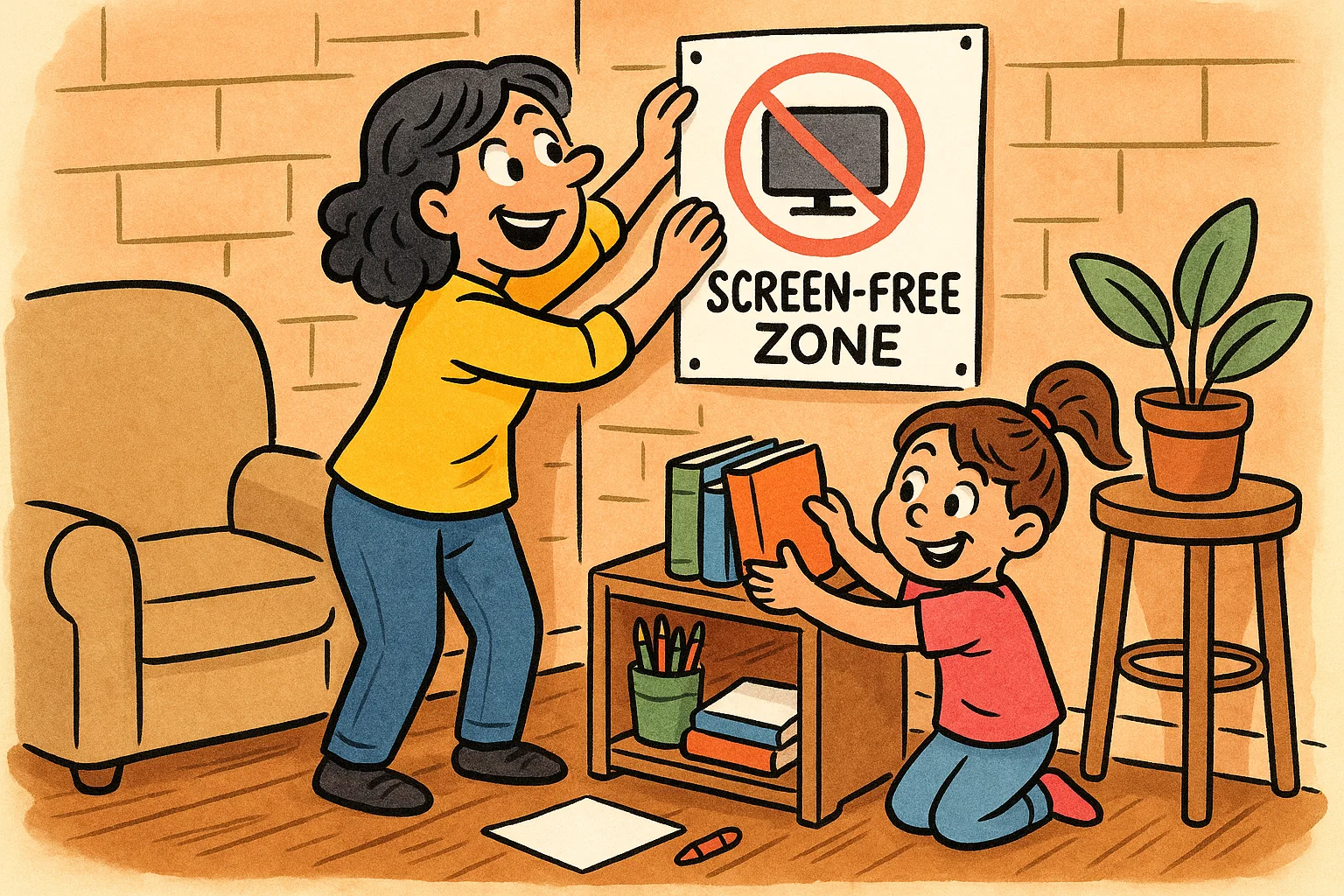Screen-Free Parenting: A Complete Guide

In today’s digital world, many parents find themselves questioning how much screen time is appropriate for their child. While technology offers educational benefits, a growing number of families are discovering the profound impact of reducing or eliminating screens from their daily routines. This comprehensive guide explores the principles, benefits, and practical strategies of screen-free parenting to help you make informed decisions for your family.
What is Screen-Free Parenting?

Screen-free parenting represents a deliberate approach to raising children with minimal or no exposure to digital devices during their formative years. This parenting philosophy prioritizes real-world experiences, hands-on play, and face-to-face interactions over video games, phones, and other electronic entertainment.
Screen-free vs. limited screen time
The distinction between completely screen-free households and those with limited screen time often depends on individual family circumstances and values. Some families eliminate all recreational screen use until children reach school age, while others set strict boundaries around when and how screens are used at home.
Research from the American Academy of Pediatrics suggests that children under 18 months should avoid screens entirely, except for video chatting. For toddlers aged 18-24 months, parents should watch high-quality programming together with their child. However, many screen-free advocates extend these recommendations well beyond the toddler years.
Why families choose this approach
Parents who embrace screen-free parenting often cite concerns about the rapid pace of technological change and its impact on young minds. Dr. Dimitri Christakis, a pediatric researcher, notes in his podcast that “the average child is exposed to 7-10 hours of screen media daily,” which may interfere with critical developmental milestones.
Families frequently report that removing screens creates more opportunities for meaningful connection, independent play, and skill development. Many parents feel that their child demonstrates improved attention spans, better emotional regulation, and enhanced creativity when screens are limited or eliminated.
Getting started
Transitioning to a screen-free lifestyle doesn’t happen overnight, especially if your family currently relies heavily on digital entertainment. Start by identifying specific times and places where screens will be eliminated first – perhaps during meals or in bedrooms.
Create a plan that addresses potential challenges, such as long car rides or rainy days when you might typically rely on video entertainment. Stock up on books, toys, art supplies, and other engaging alternatives before making the change. Remember that this adjustment period may take several weeks as your child adapts to new routines.
The Benefits of Limiting Screen Time

The advantages of reducing screen exposure extend far beyond simply preventing negative effects.
Improved cognitive development
When children step away from passive screen consumption, their brains have more opportunities to engage in active learning processes. A study published in JAMA Pediatrics found that “children who exceeded screen time recommendations showed lower cognitive development scores.”
Without the constant stimulation of video content, children develop stronger problem-solving skills and learn to entertain themselves through creative thinking. This independence often translates into better performance at school, where children need to focus for extended periods without digital assistance.
Young children’s brains are particularly sensitive to the rapid scene changes common in many programs. By limiting exposure during these critical years, parents may help preserve their child’s natural attention span and ability to engage deeply with activities.
Fostering creativity and imagination
Perhaps nowhere is the impact of screen-free parenting more evident than in children’s creative development. Without predetermined storylines and characters from shows or games, children must invent their own adventures and scenarios during play.
A boy who might have spent an hour watching superhero videos instead spends that time building elaborate fortresses with blocks or creating imaginary worlds in the backyard. A girl who previously played tablet games now writes stories, draws pictures, or engages in complex pretend play scenarios.
This shift toward imaginative play develops crucial skills that serve children throughout their lives. Creative problem-solving, storytelling abilities, and the confidence to generate original ideas all flourish when children have regular opportunities for unstructured, screen-free play.
Better sleep and behavior
The blue light emitted by phones, tablets, and televisions can disrupt natural sleep patterns, making it harder for children to fall asleep and achieve restorative rest.
Families who eliminate evening screen time often notice their child falls asleep more easily and wakes up more refreshed. This improved sleep quality has cascading effects on behavior, mood regulation, and learning capacity throughout the day.
Many parents also report that their child’s behavior becomes more regulated when screens are limited. Without the overstimulation that can come from fast-paced video content, children often show improved emotional control and less aggressive or hyperactive behavior.
| Sleep Benefits | Behavioral Improvements |
| Faster sleep onset | Better emotional regulation |
| Deeper sleep quality | Reduced aggression |
| More consistent sleep schedule | Improved attention span |
| Less bedtime resistance | Greater cooperation |
A Guide to Implementing Screen-Free Parenting

Successfully transitioning to screen-free parenting requires thoughtful planning, patience, and creativity. The key lies in replacing screen time with engaging alternatives rather than simply removing entertainment without substitution.
Setting screen time boundaries
Clear, consistent boundaries help children understand expectations and adapt to new routines more easily. Start by establishing specific screen-free times and spaces in your home. Many families find success with rules like “no screens during meals” or “bedrooms are screen-free zones.”
For families with older children who attend school, consider creating a gradual transition plan. You might begin by eliminating recreational screen time on weekdays while allowing limited use on weekends. This approach helps children adjust while maintaining some familiar routines.
Communication is crucial during this process. Explain to your child why you’re making these changes, using age-appropriate language to discuss the benefits of real-world play and family time. Children who understand the reasoning behind rules are more likely to cooperate with new expectations.
Fun alternatives to screens
The success of screen-free parenting often depends on having compelling alternatives readily available. Stock different areas of your home with engaging activities that match your child’s interests and developmental stage.
Creative Activities:
- Art supplies (crayons, markers, paper, stickers)
- Building toys (blocks, magnetic tiles, construction sets)
- Musical instruments (child-sized keyboards, drums, recorders)
- Craft materials for special projects
Physical Activities:
- Outdoor toys (balls, jump ropes, sidewalk chalk)
- Indoor movement games (dance music, yoga cards)
- Sports equipment appropriate for your child’s age
- Adventure gear for backyard exploration
Quiet Activities:
- Age-appropriate books and picture books
- Puzzles and brain teasers
- Board games and card games for the family
- Journals or notebooks for writing and drawing
The key is rotating these activities regularly so children don’t become bored with available options. Consider creating special boxes or bins that you bring out at different times of the week to maintain novelty and excitement.
Dealing with resistance and tantrums
Every parent implementing screen-free rules will face resistance at some point. This reaction is completely normal and often indicates that the changes are having their intended effect. Children may initially feel frustrated or bored when their usual entertainment options are no longer available.
Prepare for this adjustment period by acknowledging your child’s feelings while remaining firm about new boundaries. Statements like “I understand you feel upset about not watching videos right now. Let’s find something fun to do together instead” validate emotions while redirecting toward positive alternatives.
During particularly challenging moments, consider these strategies:
- Offer choices between two acceptable alternatives
- Engage in the alternative activity alongside your child initially
- Create special one-on-one time to compensate for the perceived loss
- Maintain consistent expectations even when resistance is strong
Remember that this adjustment period is temporary. Most families report that resistance decreases significantly after 2-3 weeks as children discover the joy of screen-free activities.
Raising Screen-Free Boys and Girls

While the principles of screen-free parenting apply universally, understanding how children of different genders might respond to these changes can help parents tailor their approach more effectively.
Play at the edge of comfort
Both boys and girls benefit from play experiences that challenge them slightly beyond their current comfort zone. Without screens providing instant gratification, children learn to persist through frustrating moments and develop resilience.
A young boy might initially resist building a complex tower with blocks, preferring the immediate success of a video game. However, with patient encouragement, he discovers the deep satisfaction that comes from completing a challenging construction project. This experience builds confidence and teaches valuable lessons about persistence.
Similarly, a girl who typically enjoyed passive entertainment through shows might initially struggle with open-ended creative play. Over time, she may develop rich storytelling abilities and artistic skills that bring lasting fulfillment.
The key is providing gentle encouragement while allowing children to work through challenges independently. This balance helps them develop problem-solving skills and internal motivation that serve them well throughout life.
Fostering social skills
Screen-free environments naturally create more opportunities for social interaction and communication skill development. Without digital distractions, children engage more fully with family members, friends, and their broader community.
Children learn to read facial expressions, interpret tone of voice, and respond appropriately to social cues through regular face-to-face interactions. These skills prove invaluable at school, in friendships, and eventually in professional relationships.
Family game nights, collaborative art projects, and outdoor adventures provide structured opportunities for social skill practice. Children learn to take turns, negotiate rules, express their needs clearly, and work cooperatively toward shared goals.
Many parents notice that their child becomes more comfortable initiating conversations and engaging with both children and adults when screen time is limited. This increased social confidence often extends into school settings and community activities.
Your Role as a Parent

Successful screen-free parenting requires active engagement and thoughtful modeling from parents. Your attitude and behavior significantly influence how your child adapts to and embraces these lifestyle changes.
Be a good role model
Children learn more from what they observe than from what they’re told. If you want your child to engage in screen-free activities, you must demonstrate this behavior consistently in your own life.
This might mean putting away your phone during family meals, choosing books over streaming services during leisure time, or engaging in hands-on hobbies that your child can observe and eventually join. When children see their parents actively choosing real-world activities over digital entertainment, they’re more likely to make similar choices.
Consider establishing family screen-free times when everyone participates together. These shared experiences strengthen family bonds while demonstrating that screen-free time can be enjoyable and fulfilling for people of all ages.
You are the expert for your family
While research and expert advice provide valuable guidance, remember that you know your child and your family’s unique circumstances better than anyone else. Some children may thrive with complete screen elimination, while others might benefit from carefully limited and curated digital experiences.
Trust your instincts about what works best for your specific situation. A special needs child might require different approaches than typically developing children. Families dealing with challenging life circumstances might need to modify ideal recommendations to fit their reality.
The goal is not perfection but rather making thoughtful choices that support your child’s healthy development and your family’s overall well-being. Stay flexible and adjust your approach as your child grows and your circumstances change.
Monitor your child’s response to screen-free initiatives and be willing to make modifications when necessary. Some children adapt quickly and enthusiastically, while others need more time and support to embrace new routines successfully.
Frequently Asked Questions
How do I handle screen time when my child visits friends or relatives who have different rules?
Consistency at home is most important, but flexibility in social situations can prevent your child from feeling isolated. Before visits, communicate with other parents about your preferences, but be prepared to allow some screen time in social contexts. Use these experiences as opportunities to discuss your family’s values and choices.
What if my child needs to use technology for school assignments?
Educational screen use differs from recreational consumption. Work with your child’s teachers to understand necessary technology requirements and help your child distinguish between productive and entertainment-focused screen time. Many screen-conscious families successfully navigate educational technology while maintaining limits on recreational use.
At what age should I consider introducing limited screen time?
This decision varies by family, but many screen-free advocates suggest waiting until children demonstrate strong self-regulation skills and can engage independently in non-screen activities for extended periods. Some families maintain strict limits until children reach elementary school age, while others extend screen-free approaches even longer.
How do I handle long car trips or airplane travel without screens
Travel requires extra preparation but offers wonderful opportunities for family bonding. Pack audiobooks, travel games, art supplies, and special toys reserved specifically for travel. Plan regular stops for physical activity and fresh air. Many families discover that children adapt to travel entertainment more quickly than expected.
What if I work from home and sometimes need my child to be quietly occupied?
Create special “quiet time” activities that don’t involve screens. Audiobooks, puzzle boxes, coloring books, or independent play bins can provide focused entertainment during important work calls or meetings. Consider hiring childcare for particularly demanding work periods rather than relying on screens as a regular babysitter.

